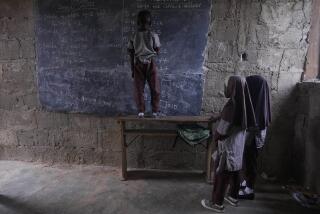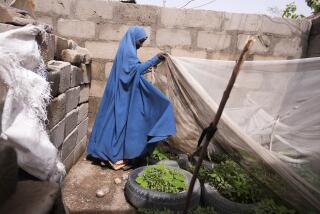Nigeria Mired in Poverty as Voting Nears : Africa: The OPEC member state was once awash with oil wealth. Now it struggles against a $28-billion debt and an annual inflation rate of more than 60%.
- Share via
LAGOS, Nigeria — Poverty stalks the mean streets of Lagos. Many of the 10 million people in Nigeria’s biggest city are struggling for survival.
It hardly bodes well for an elected civilian government, which the military, in power since 1983, has promised will take over on Aug. 27.
The government-fixed minimum wage is around 700 naira a month--about $34. Its buying power has been devastated, and the unemployed--40% of the work force nationwide--have even less.
“Bread now costs 10 naira (nearly 50 U.S. cents) a loaf and it costs me 28 naira ($1.30) a day to commute in Lagos,” said Ganiyu Hamed, a driver with a wife and three children.
Ten years ago, when the Nigerian currency was at parity with the dollar, Hamed earned 350 naira, a modest wage at the time.
“Then we could afford anything and travel. Today, I cannot afford to get my old and broken television set fixed,” he said.
The story is the same elsewhere in both the mainly Christian south and the largely Muslim north, whose rivalries have hurt development since independence from Britain in 1960.
Harder times lie ahead as Nigeria, an OPEC member once awash with oil wealth, struggles against a $28-billion debt and an annual inflation rate of more than 60%.
Still in the pipeline is a big increase in gasoline prices, with ripple effects throughout the economy.
The military government had promised overseas creditors it would slash spending on fuel subsidies at the end of May. It backed off last month, deciding the measure would be too explosive before the presidential election, which is set for June 12.
The military, led since 1985 by Gen. Ibrahim Babangida, have given Nigerians a long spell of austerity to mend an economy ruined by corruption and extravagance during a previous spell of civilian rule.
But the program has almost wiped out Nigeria’s middle class, pushing it into poverty, while the rich have gotten richer.
Yam, a staple food, costs 35 naira ($1.60) a tuber, up from 15 naira. Rent for one room in an outlying suburb has doubled in the last year to about 250 naira a month.
“The gap between rich and poor has become so wide and frightening. To some, perhaps, every facet of life seems dead,” said the Rev. Joseph Adetiloye, primate of the Anglican Church of Nigeria.
“The naira has become almost valueless and the cost of food, accommodation and transportation has become so excessive that many people are hungry, homeless and jobless,” Adetiloye told his congregation at Easter.
Religion has always played a forceful role in Africa’s most populous country but never more so than now, Christians and Muslims say.
“Our problems are caused by mismanagement. Only God can save us,” said Arthur Erinle, a retired civil servant who spends much of his time searching local markets for food and clothing he can afford.
According to pharmacist Hyacinth Agubaohia, “Big men are now poor men while criminals are big men. Corruption has taken over. We are waiting for the Kingdom of God.”
Few Nigerians seem likely to recall the early months of 1993 for its political events--the fractious preparation for a return to democratic political life.
What they will remember is the agony of skyrocketing prices and a surge of car thefts and street violence.
Some hardly care about democracy; others advocate that the current government remain in power.
“I don’t want the military to go,” said Henry Nwosu, a 50-year-old peasant with eight children who lives in a village on the outskirts of Lagos. “With the civilians, there will be trouble.”
More to Read
Sign up for Essential California
The most important California stories and recommendations in your inbox every morning.
You may occasionally receive promotional content from the Los Angeles Times.










